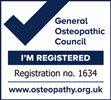Osteopathy is a safe and natural hands on approach to healthcare. Osteopaths are trained to recognise and treat many causes of pain. It is an established system that focuses on the diagnosis, treatment, prevention and rehabilitation of musculoskeletal disorders and the effects of these on the patient's general health. It lays its main emphasis on the structural and functional integrity of the body. Osteopaths use their hands both to investigate the underlying causes of pain and to carry out treatment. They use a variety of techniques including gentle soft tissue mobilisations, careful, specific joint manipulations, and may well compliment these with tailored exercises and postural advice.
When you visit your osteopath for the first time they will listen to you and take a full medical case history. This will be followed by a thorough clinical examination (this may well require you to remove some outer items of clothing). Once an initial diagnosis has been made and fully discussed with the patient, you will be treated as an individual, with a personal and specific treatment plan being developed to ensure the most prompt and appropriate course of action. This should include pain relief, prevention of a reoccurrence and long term structural, functional, and postural well being.
Osteopathy works to restore the musculoskeletal system of the body to a state of balance and harmony, thus promoting health. The beneficial effects of osteopathy are far-reaching. Conditions that we commonly treat include, but are not limited to:
- Generalised aches and pains
- Arthritic pain
- Acute and chronic backache and pain
- Mechanical neck pain
- Headaches and migraines
- Joint pains
- Lumbago
- Sciatica
- Muscle spasm
- Neuralgia
- Fibromyalgia
- Rheumatic pain
- Sports injuries
- Tensions and inability to relax
- Cramp
- Circulatory problems
- Digestive problems
All Osteopaths are skilled practitioners, who have trained to a high level and are registered with, and regulated by, the General Osteopathic Council.
All General Osteopathic Council (GOsC) registered osteopaths must follow high standards of professional conduct and behaviour. Under the terms of their registration they must also commit to undertaking continuing professional development.
Osteopaths have medical malpractice insurance and statutory regulation ensures that patients have the same safeguards as when they consult a doctor or dentist.
It is not necessary to see your GP before seeing an osteopath. If further investigations are required your GP may be contacted, but only with your consent.

